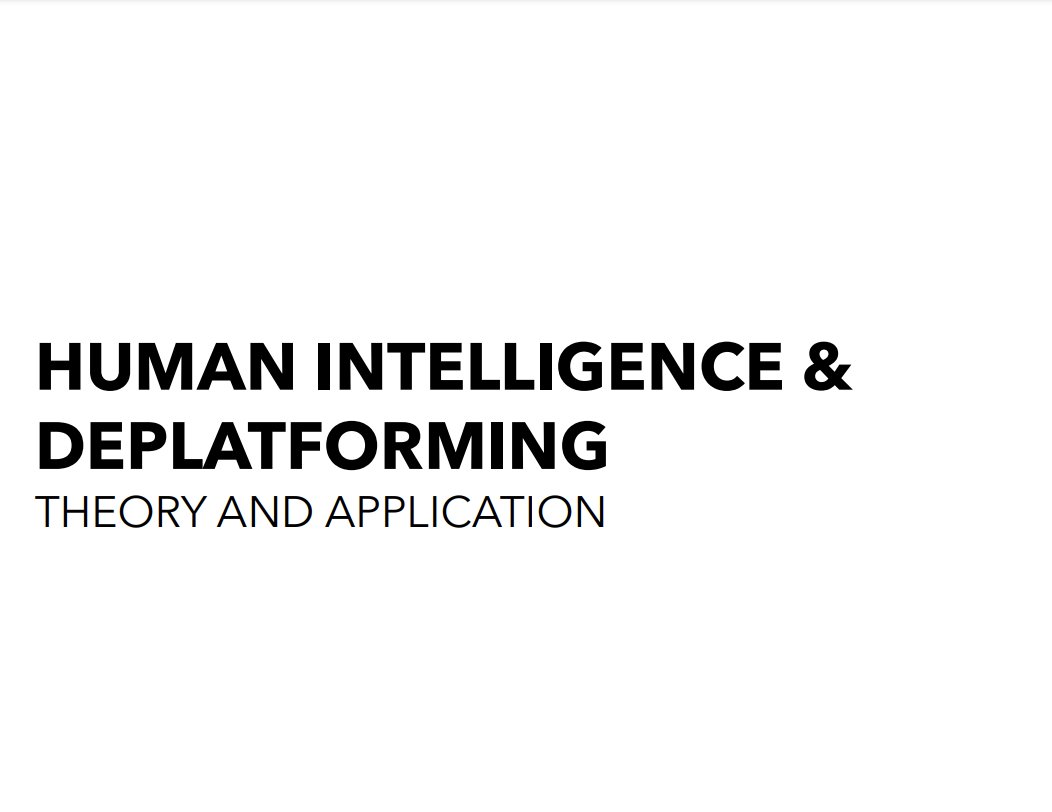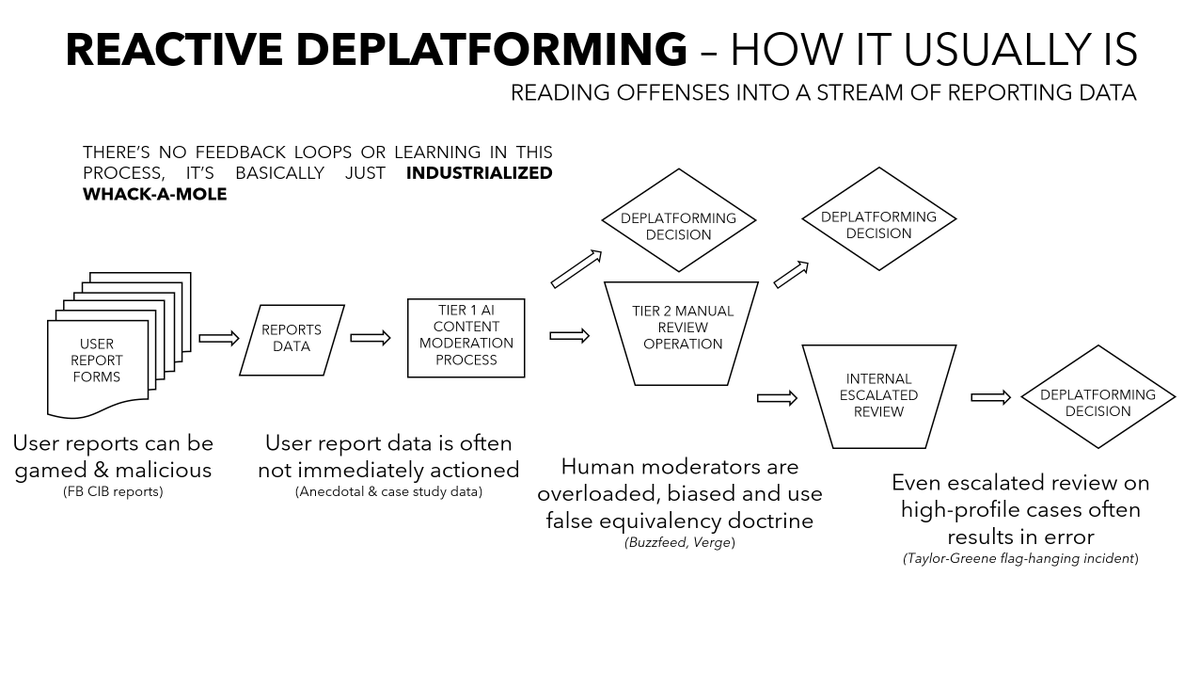My #NAFO story started two years ago hunting Nazis for @Meta.
My team recorded 3,500+ accounts on Facebook and Instagram neo-Nazi, accelerationist, or just plain old garden variety extremist assholes.
I didn't really think much of it until I bothered counting them.
(🧵)
My team recorded 3,500+ accounts on Facebook and Instagram neo-Nazi, accelerationist, or just plain old garden variety extremist assholes.
I didn't really think much of it until I bothered counting them.
(🧵)

In June of '21 I sampled 491 accounts we'd sent for deplatforming over the past six months.
When I did the math and saw that less than 8% of them were getting removed, that's when that job really ended, I realize now.
Because that job was basically a lie.
When I did the math and saw that less than 8% of them were getting removed, that's when that job really ended, I realize now.
Because that job was basically a lie.

What was happening then, and still is now, is no better than a rather large game of whack-a-mole played by Palantir alumni and wannabes inside Meta.
This would be fine, if they were actually removing the bad shit.
They aren't. They actually hide it.
This would be fine, if they were actually removing the bad shit.
They aren't. They actually hide it.

So, this is the type of pattern you see all across Facebook & Instagram, still.
Let me translate this out of bureaucratese:
Facebook *purposefully* made its German law reporting form hard to use so that its complaint numbers stay artificially low.
Let me translate this out of bureaucratese:
Facebook *purposefully* made its German law reporting form hard to use so that its complaint numbers stay artificially low.

This is basic, basic business logic for a publicly traded company.
It is so inordinately expensive to do content moderation correctly that it is actually cheaper just to eat the bad PR, lost goodwill and legal penalties that go with half-assed content moderation.
It is so inordinately expensive to do content moderation correctly that it is actually cheaper just to eat the bad PR, lost goodwill and legal penalties that go with half-assed content moderation.
Twitter, under Elon, is no different, just more up-front about not giving a fuck.
Look, the man isn't (that) stupid. Callow, immature, lacking in common sense or consideration, classless, trashy, yes, but stupid, no.
He knows this is happening.
He just doesn't care.

Look, the man isn't (that) stupid. Callow, immature, lacking in common sense or consideration, classless, trashy, yes, but stupid, no.
He knows this is happening.
He just doesn't care.


When the war hit in February of last year, my lawyer and I sat down, and said, look, we gotta do something.
This Facebook Nazi stuff is fine, but what do you have on Ukraine? Can you help make a difference right now? Are there, say, Russian propagandists on Facebook you found?
This Facebook Nazi stuff is fine, but what do you have on Ukraine? Can you help make a difference right now? Are there, say, Russian propagandists on Facebook you found?
To which I replied, YUP.
It's probably not going to be a surprise to anyone in NAFO, but even nowadays, if you want to find Russian agitprop on Facebook or Insta all you need to do is throw a damn rock in the air, it'll land on someone either believing or repeating the lies.
It's probably not going to be a surprise to anyone in NAFO, but even nowadays, if you want to find Russian agitprop on Facebook or Insta all you need to do is throw a damn rock in the air, it'll land on someone either believing or repeating the lies.
The list of L/DPR accounts I found, some of the flagrant sanctions violators, and the disclosure we wrote from it, targeting OFAC, the FBI National Security Division and the State Department earned me my first substantive mention in the Washington Post.
washingtonpost.com/technology/202…
washingtonpost.com/technology/202…
I should mention, since it probably isn't clear:
This is all hustle for me at this point, I'm not contracting in private intelligence anymore.
Calling out your client as incompetent at handling Nazis is not a great way of getting those jobs, hence:
patreon.com/joohn
This is all hustle for me at this point, I'm not contracting in private intelligence anymore.
Calling out your client as incompetent at handling Nazis is not a great way of getting those jobs, hence:
patreon.com/joohn
So when someone finally invited me to NAFO in September (I made a slightly annoying, in retrospect, point about being invited rather than just joining), I saw two things I could do.
One, hopefully, get some more attention to the research I was doing, at that point...
One, hopefully, get some more attention to the research I was doing, at that point...
...not just the Nazis I found for Facebook, not just the (pardon me) fucking L/DPR Instagram militants I found bragging about the Ukrainians they'd killed, but also sanctions designations against the L/DPR's pension fund, which pays Nazis...
https://twitter.com/JoohnChoe/status/1588742900644728832?s=20
...and the illegal shipment of plunder from Ukraine, which is STILL GOING ON, in plain view of the world.
Hey, @USTreasury, again, hate to be THAT taxpayer, but...
Where we at on this
Because here is a chart showing you who to sanction
observablehq.com/@joohn/smuggle…
Hey, @USTreasury, again, hate to be THAT taxpayer, but...
Where we at on this
Because here is a chart showing you who to sanction
observablehq.com/@joohn/smuggle…
Here is the letter I sent you explaining who to sanction, how I know, and where they are down to their street addresses and GPS coordinates, which accompanied a spreadsheet with three independent sources for every person I identify.
@USTreasury? @DOJNatSec?
Bueller?
@USTreasury? @DOJNatSec?
Bueller?

Two, and I've spoken of this extensively, what I saw happening with #NAFO was the first really active, growing online counter-disinfo movement I think has ever existed.
I don't think people see this in perspective: #jagahar only had at most a few thousand people.
I don't think people see this in perspective: #jagahar only had at most a few thousand people.
The Lithuanian "elves" counter-disinfo movement was a few dozen people and their supporters, most of whom were hackers - not culture hackers or influence hackers, like, hacker-hackers who write assembly and figure out the pin-outs for router serial ports.
time.com/6155060/lithua…
time.com/6155060/lithua…
NAFO as a movement is actually more important than any of the windmills I was tilting, I think, and it's real simple why.
Just read the other stories of how people came to #NAFO today.
No one is, like, "durr I wanted to fit in".
Every single one is a story of conscience.
Just read the other stories of how people came to #NAFO today.
No one is, like, "durr I wanted to fit in".
Every single one is a story of conscience.
The difference is, having people actually CARE - to the point that other people call it 'cringe', which is, I'm realizing, a success indicator given how bad those people are at being anything meaningful.
This is the "secret", if there is one, to anti-disinfo ops that way I know.
This is the "secret", if there is one, to anti-disinfo ops that way I know.
It's real simple: you just gotta make people care about the truth enough to get out and fight for it.
Not that you CAN control anything else, but to the extent you can, the rest of it either falls in place or ends up unimportant.
Not that you CAN control anything else, but to the extent you can, the rest of it either falls in place or ends up unimportant.
The virtuous cycle that starts happening when people care, and get other people to care, and put their energy into something...
That's how you escape the whack-a-mole game that Facebook is still trying to play, which Twitter doesn't even bother really doing.
The answer is NAFO.
That's how you escape the whack-a-mole game that Facebook is still trying to play, which Twitter doesn't even bother really doing.
The answer is NAFO.
Anyway. Happy NAFO day, all that.
• • •
Missing some Tweet in this thread? You can try to
force a refresh

 Read on Twitter
Read on Twitter










